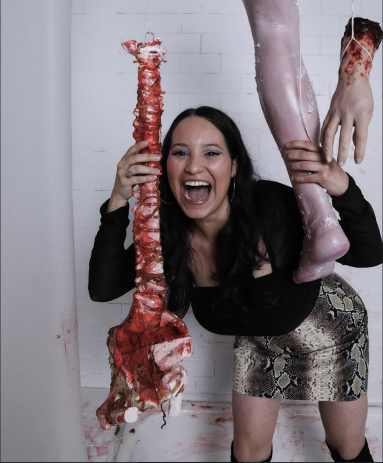20 Horror Movies About Grief
Discover 20 films where grief is front and center, driving the story and characters.
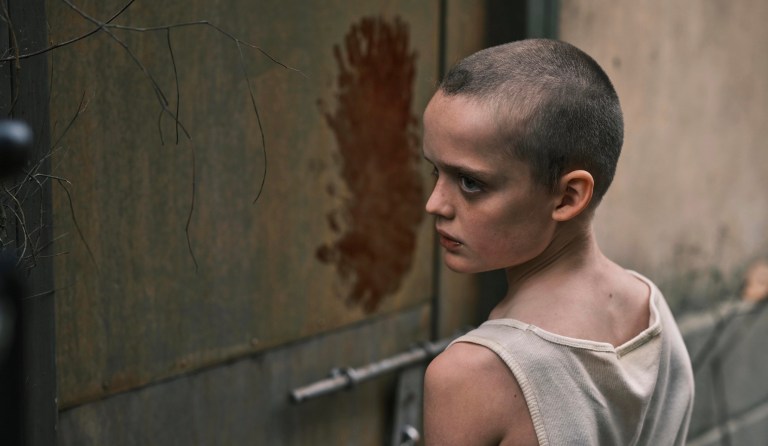
Horror is a superb genre for countless reasons. It pushes boundaries by exploring thought-provoking and revolutionary ideas that other film varieties don’t dare dive in to. Horror was the first to comment on the struggles of the LGBTQ+ community, as well as that of POC. Extremely punk in nature, horror always has a message at its core. There’s so much weight and richness in horror—it portrays the perspective of the oppressed, it captures the atrocities humanity is capable of committing in the name of greed and power, it examines the nuanced spectrum of human emotions, and it gives imperfect people a chance to be triumphant. The genre spans an incredibly broad and experimental ground for storytelling. There’s also a safe place that exists within horror that allows for the exploration of the most profound fears of the human psyche—terrors that can arise through pain and trauma. And what can be more terrifying than grief? There’s nothing scarier than losing a loved one and having to carry the permanent wounds that kind of loss can inflict.
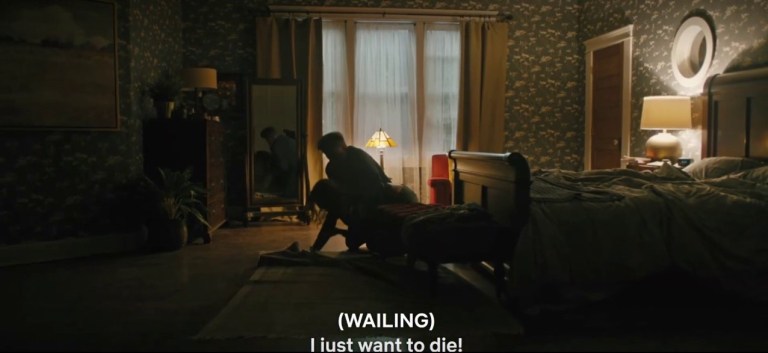
There are filmmakers in the genre who have deeply probed into the effects trauma and grief can have on families and human beings. Ari Aster has shocked all the senses viscerally portraying death and grief in unconventional ways that put the rest of Hollywood to shame. Dani’s (Florence Pugh) cries upon learning of her family’s passing are forever embedded into the souls of horror fans, as is her final chilling decision to join a new one at the end of Midsommar—a choice driven by grief. His 2018 movie Hereditary is a dark exploration of the grieving process and the trauma death leaves in its wake. In it, Aster reflects on how grief can make us behave in unpredictable, dangerous ways, and how it can tear a family apart. Mike Flanagan expertly examines grief and the idea of an afterlife in his uniquely crafted storytelling of gothic horror, providing a poignant and raw look at how death can haunt us.
Curated below are 20 horror films that meaningfully embody and portray grief:
Don’t Look Now (1973)
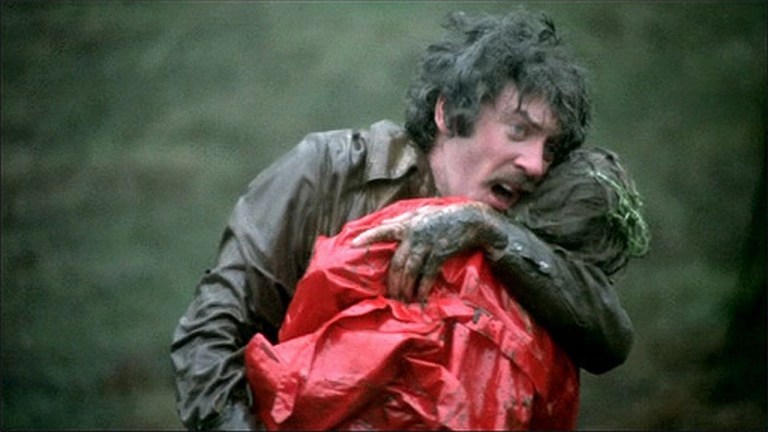
Don’t Look Now, based on Daphne du Maurier’s short story of the same name, is a British picture that intricately depicts the contrasting grief of two parents following the accidental drowning of their young daughter. Donald Sutherland and Julie Christie give strong performances as husband and wife, John and Laura Baxter. Shortly after their daughter’s death, the couple moves to Venice, where the husband has been commissioned to lead the restoration of a church. There, Laura encounters a psychic who claim to have a warning from the afterlife. Laura is intrigued by the idea, but her husband is against it, until he starts seeing glimpses of their daughter everywhere. The film portrays the dangers that bottling up loss and pain can have on the human psyche, and it explores the idea of how every person has a unique grieving process. Don’t Look Now is one of the most raw and boundary-pushing explorations of grief—one with an unforgettable and shocking conclusion.
The Changeling (1980)
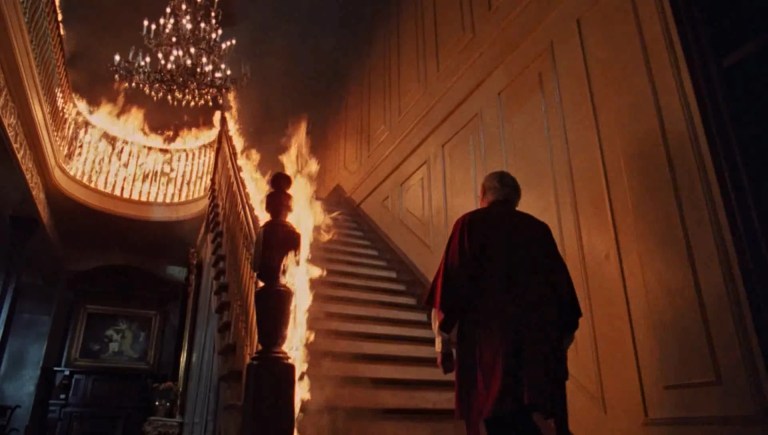
The Changeling is a Canadian haunted house classic and one of the scariest non-gory horror movies to ever have been made. George C. Scott plays John Russell, a music composer who loses his daughter and wife in an unimaginable accident and relocates to a creepy old mansion in Seattle to rebuild his life. Soon after moving in, he encounters the spirit of a little boy who was drowned in a bathtub inside the house and who wants him to aid in uncovering the mystery of his death. The movie simultaneously functions as a ghost story, gothic horror, and a whodunit. Its premise is entirely rooted in personal tragedy and the manner in which we cope with loss and grief as human beings. The Changeling draws a powerful metaphor of how trauma can haunt us like ghosts. This powerful story has been cited by the great Guillermo del Toro as one of his favorite ghost stories. In 2018, he approached director Peter Medak to call his movie a masterpiece. The inspiration is clearly evident in del Toro’s 2001 film The Devil’s Backbone
A Tale of Two Sisters (2003)
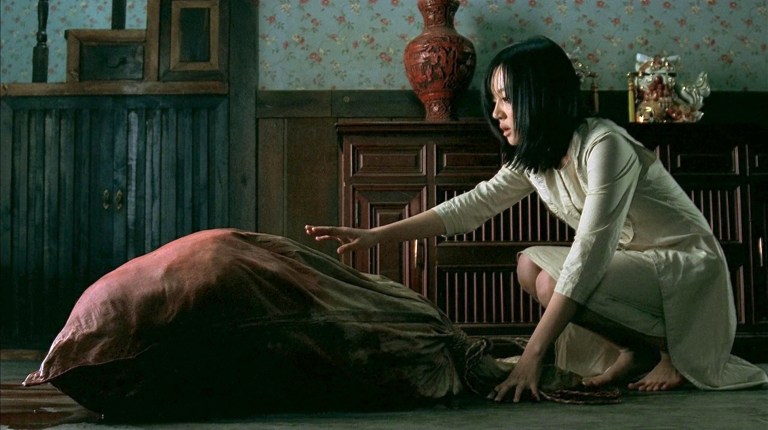
This South Korean psychological horror movie got an American remake in 2009 as The Uninvited, though much of the premise was altered and it truly came nowhere near to matching the tour de force that was its predecessor. After spending time in a mental hospital, teen Su-mi (Im Soo-jung) is reunited with her dearly beloved sister Su-yeon (Moon Geun-young) when she returns to live in their family country home. The two girls are extremely resentful of their widowed father’s (Kim Kap-su) new wife (Park Mi-hyeon). When they begin experiencing a string of strange events, Su-mi begins to suspect their stepmother of truly sinister acts. A Tale of Two Sisters is a smartly-crafted and atmospheric story about guilt, regret, and grieving, as well as a heartbreaking study of how loss can tear apart a family forever. The film is a reminder that grief must be faced and processed by whatever means necessary. Unless confronted, it will physically manifest itself, and when it does, it can often be too late.
Lake Mungo (2008)
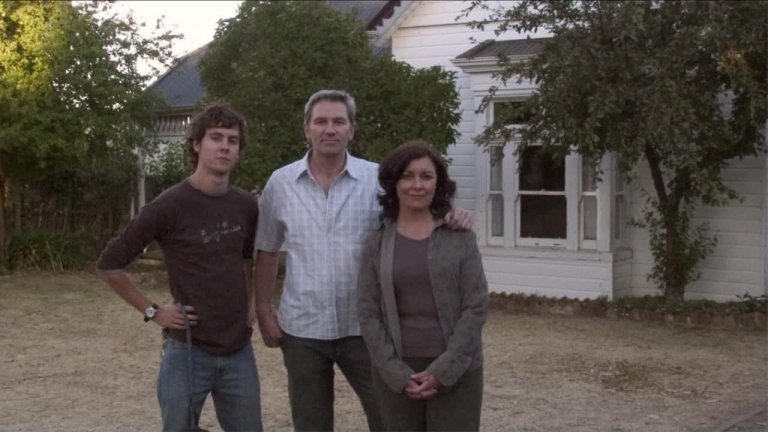
The Australian Lake Mungo is one of the most underrated horror gems and one of the most melancholy representations of grief in horror. Told in a mockumentary style with found footage elements, a grieving family tries to make peace with the drowning of their 16-year-old daughter, Alice Palmer (Talia Zuker) and experience potentially supernatural phenomena. After hiring a paranormal psychologist, they uncover Alice’s secret double life. Lake Mungo offers an intimate study of grief, not just that of Alice’s parents and brother, but of Alice’s own. This somber meditation on trauma and inexplicable loss creeps up on you through deeply unsettling and emotional moments. The film’s ending stays with you—it’s one of the most haunting and devastating in the genre. Mike Flanagan called the movie, “one of the greatest independent horror films ever made.”
We Are Still Here (2015)
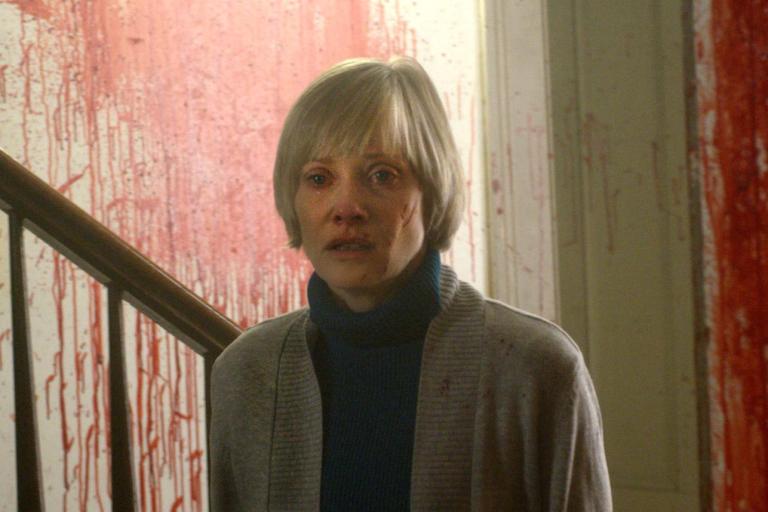
Iconic scream queen Barbara Crampton stars as Anne Sacchetti in this film about a couple who relocates to a remote house in a rural town in an attempt to overcome the grief caused by their son’s tragic death. Shortly after moving in, she and her husband Paul begin sensing a spiritual presence, and Anne is convinced it’s her son, Bobby, who is with them. The spouses invite their friends, a spiritualist couple, to help them solve the mystery and hopefully aid in contacting their son’s spirit. All is not what it seems in their new home in the wintery fields of New England, for their newly purchased house comes with a dark history—one that demands a sacrifice. We Are Still Here portrays how grief can distort your reality, how it can eat you alive, and how it can give you reason to have faith—reason to believe the one you lost is still with you.
A Dark Song (2016)
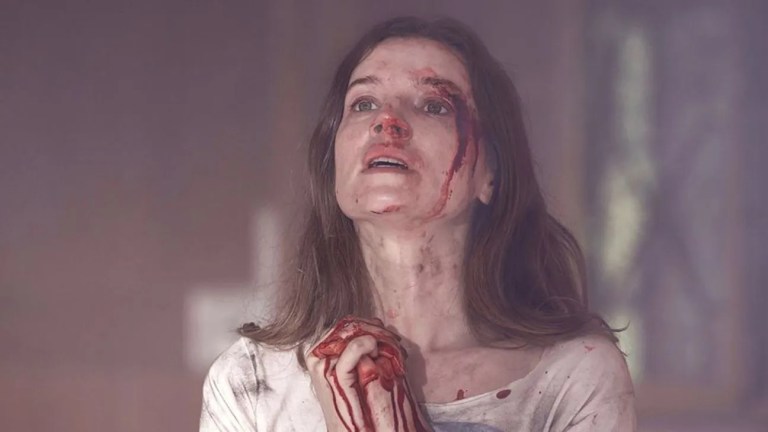
A Dark Song is a slow-burn, feverish nightmare that may not be for every horror fan, but it pays off with an incredibly powerful ending. It is entirely driven by the shining performances of its two leads. The stifling atmosphere in this movie highlights how grief can slowly drive you mad and swallow you whole. It’s also one of the most realistic and knowledgeable explorations of ritual magic to be put on film. The story follows Sophia (Catherine Walker), a mother whose son was murdered in a Satanic ritual. Grief and vengeance drive her to employ occultist Joseph Solomon (Steve Oram) to lead her in a months-long torturous rite from the Book of Abramelin, which will allow her to speak to her guardian angel so she can be granted one wish. A Dark Song is a tale about obsession, forgiveness, tyrannical power dynamics, and how grief irrevocably changes a person. With its countless breathtaking shots, it’s almost impossible to believe it was produced with only $50,000.
The Invitation (2015)
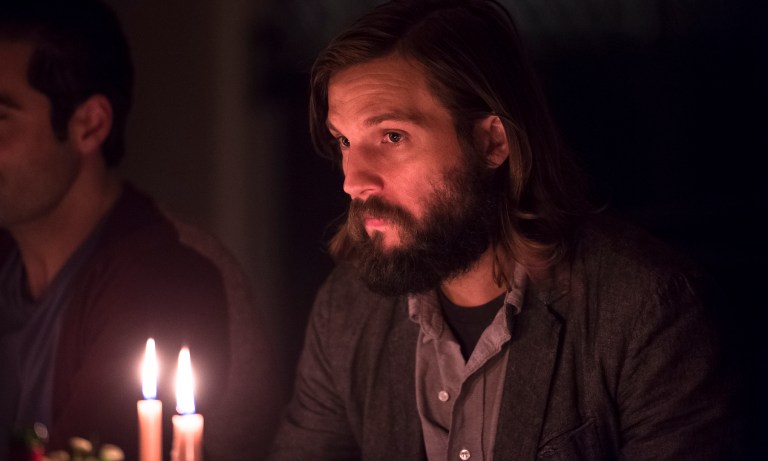
Directed by Karyn Kusama, The Invitation draws on real life issues of grief, denial, trauma, anxiety, anger, and depression. Will (Logan Marshall-Green) and his girlfriend (Emayatzy Corinealdi) attend a dinner party hosted by his ex-wife (Tammy Blanchard) and her current partner (Michiel Huisman) two years after the accidental death of their son. Throughout the night, Will can’t shake the creeping suspicion that his former spouse and charming new husband have ulterior—and possibly sinister—motives. The Invitation is a masterclass in depicting the dangerous places a grieving person can be driven to in order to run away from their pain and escape their excruciating reality.
Ouija: Origin of Evil (2016)
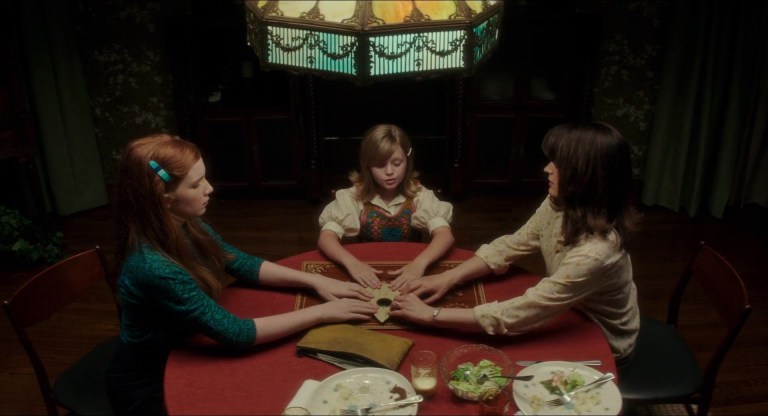
Mike Flanagan is a masterclass at bringing life to grief on the screens of horror fans. Set in 1967 Los Angeles, a widowed mother runs a seance scam business to make ends meet with the help of her two young daughters. She believes that although not real, she’s helping people who have lost loved ones find closure. When they start to use a Ouija board to boost their act, they make contact with a spirit who claims to be their deceased father. Ouija: Origin of Evil is a rich and inventive story about the consequences of untreated grief, and how grief makes us desperately cling on to the idea that those who we lost are still with us.
The Night House (2020)
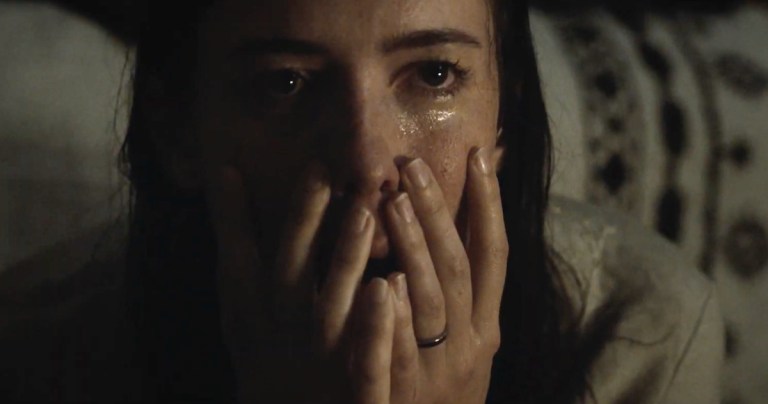
Rebecca Hall is mesmerizing and unforgettable in yet another Oscar-worthy performance in horror to go unrecognized. Her character Beth has recently and inexplicably lost her husband to suicide and is processing her grief and anger in unexpected and unhealthy ways. She spends most of her time alone in the lake house he built for her, drinking until she can’t anymore and passing out in odd places. Her fury is always there, just simmering beneath the surface. Beth has never believed in an afterlife, not since a car accident left her legally dead for four minutes when she was younger and she experienced nothing. When she starts having strange dreams and experiencing bizarre events that lead her to uncover her husband’s darkest secrets, she becomes less skeptical. The evil Beth pursues in this film is a stand-in for her grief and depression. It’s a darkness that, as evident in the final shot, will never leave her. She will be fighting against it for the rest of her life.
Talk to Me (2022)
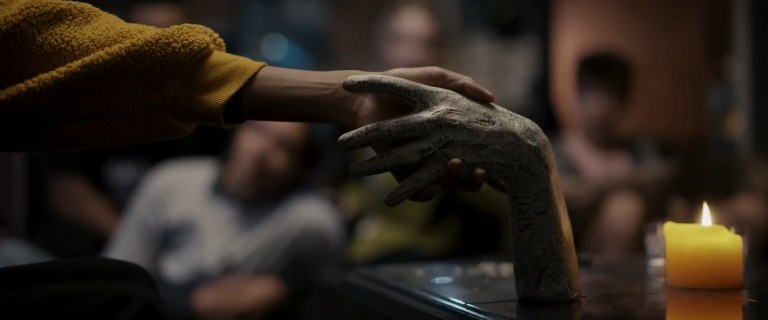
Grieving drives the story in Talk to Me, the best horror movie to have been officially released in 2023. A group of friends finds a new thrill in a mysterious severed and embalmed hand that can be used to conjure up spirits. When Mia (Sophie Wilde) goes too far, a sinister evil is unleashed and will not let go. The film is a brilliant exploration of grief and depression, and also functions as a metaphor for addiction, specifically the relationship between bereavement and substance abuse. Through Mia’s emotionally and turbulent story, the viewer is forced to meditate on how grief can prey on your weaknesses, fears, and regrets.
See also: Talk to Me: Ending Explained
More horror movies that meaningfully explore grief…
Pet Sematary (1989) malevolent forces are unleashed when a grief-stricken father brings his child back to life in this adaptation of Stephen King’s novel.
Antichrist (2009) a Lars von Trier film about a grieving couple who retreats to their cabin in the woods where they hope to repair their marriage, and where they begin to experience strange visions. Guilt and grief manifest in increasingly violent and sadomasochistic behavior.
Absentia (2011) is directed and written by Mike Flanagan. It revolves around a woman preparing to declare her husband dead in absentia. Her and her sister link his vanishing to a mysterious tunnel connected to a string of disappearances.
The Babadook (2014) the monster in this film serves as a metaphor for the grief of a widowed mother haunted by her husband’s death.
Hereditary (2018) in this Ari Aster film, the matriarch of a family dies and her relatives are left haunted by tragic, bizarre occurrences.
A Quiet Place (2018) portrays grief in absolute silence. A family struggles for survival in a post-apocalyptic world where noise-sensitive creatures have killed off most of humanity.
Midsommar (2019) grief and loneliness drive Dani (Florence Pugh) into the arms of a new family in this Ari Aster film about a group of friends who travel to Sweden to visit a commune’s midsummer festival.
The Lodge (2019) two children grieving the suicide of their mother terrorize their father’s girlfriend over Christmas at their remote cabin.
The Dark and the Wicked (2020) is an unflinching examination of grief. The movie focuses on the family of a dying man who gathers to mourn at their isolated farmhouse.
Anything for Jackson (2020) bereaved grandparents try bringing their grandson back to life by placing his spirit in a woman’s unborn child.
Dark Windows (2023) grief over a drunk driving accident plays a major role in this cabin in the woods slasher movie.
Bring Her Back (2025) deals with the grief of two recently orphaned siblings as well as that of their new foster mom.
